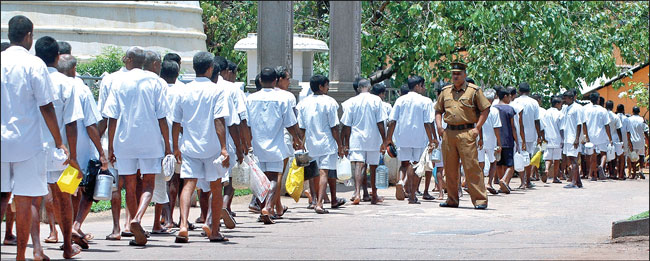Overcrowding in Prisons: causes, remedies
 The ICRC study on overcrowding in prisons is deeply depressing, not
only because of the sordid picture it reveals, but also because reform
would be so easy, if only there were better coordination. Unfortunately
we have now in Sri Lanka built up a system in which coordination is
almost impossible, and the information that should stir authorities to
change things is rarely systematically collated and effectively
presented. The ICRC study on overcrowding in prisons is deeply depressing, not
only because of the sordid picture it reveals, but also because reform
would be so easy, if only there were better coordination. Unfortunately
we have now in Sri Lanka built up a system in which coordination is
almost impossible, and the information that should stir authorities to
change things is rarely systematically collated and effectively
presented.
It was the Minister of Justice who initially alerted me to the ICRC
study, and much of the change has to come from institutions connected
with justice.
The ICRC study notes that, ‘Out of the total admissions in 2010……
75.7 percent (100,191) consisted of remandees, of whom 21.9 percent
spent between 14 days and 1 month in remand and 25.5 percent (3,367)
spent less than 14 days in remand’.

Since the approximate average cost per prisoner per day is Rs.
318.00, the total per month (Estimated approx total cost for month
(100,000 detainees x 30 days) is Rs. 954,000,000, ie 12 billion rupees a
year, given that some months are longer.
Human Rights Commission
The ICRC notes, as indeed the Human Rights Commission had previously
pointed out to us, that there is ‘Inadequate use of Bail.’ Unfortunately
there seems no urgency to expand the list of bailable offences, which
was suggested long ago, while Police tend to charge in terms of non-bailable
offences since they do not want to take the risk of those they have
taken in jumping bail. Neither the Police nor magistrates use their
discretion positively to grant bail.
To make matters worse, there is little sense of urgency about dealing
with remandees. The average population in jail on any given day is
around 26,000, half of whom are remandees. This latter population is not
necessarily a shifting one, for in 2010, '258 prisoners had been on
remand for over five years, and a further 1,085 prisoners had been on
remand between two to five years. 10.2 percent (average) of remandees
had been on remand for over two years’.
The ICRC, as the Human Rights Commission did before, notes the
‘Effects of strict sentencing policies'. In his budget speech the
President spoke of the need to develop ‘Alternatives to Incarceration’,
but the ICRC notes that there is limited use of these.
Narcotic drug offences
|

Finding solution to prison overcrowding vital |
Obviously the relevant authorities are incapable of translating the
President’s stated policies into action, but unfortunately Sri Lanka
has, despite having had an Executive Presidency for over 30 years,
failed to develop the mechanisms other countries with Executive
Presidencies have to ensure implementation of what the President lays
down.
We find then that in 2010, ‘43.9 percent of the total convicted
population served less than six months’ while 20 percent spent between
six months to a year….50 percent of the total convicted prisoners were
imprisoned due to default in the payment of fines’ whereas it would be
quite simple to institute the practice of community service to allow
such fines to be paid off. It does not take a genius to think of this,
but I suppose putting such ideas into practice does require genius,
given the current approach to reform.
The ICRC also noted that drug offenders require a ‘therapeutic
approach: in 2010, persons convicted for narcotic drug offences
constituted 41.6 percent of the total convicted admissions’. Instead of
providing therapy and rehabilitation however, our system seems designed
to entrench the practice, and even to promote drug dealing, since
youngsters jailed for the use of drugs can readily be turned into
dealers, given the culture prevalent in our prisons.
In short, our current system costs taxpayers billions, while
promoting the criminalization of offenders who should be rehabilitated
and who could serve the community to make up for the relatively minor
offences for which they were convicted. Last year the President urged
more recourse to rehabilitation, and in fact we have an experienced and
efficient agency in the field in the form of the Bureau of the
Commissioner General for Rehabilitation.
Unfortunately, with the rehabilitation of former LTTE combatants
almost completed, and no formal responsibility given to the Bureau for
the all important Reintegration process, doubtless the Bureau will soon
be wound up.
Introduce legislation
A few years later perhaps the Ministry of Rehabilitation and Prison
Reforms, shown of half its title and responsibilities, will decide that
they need to develop a Rehabilitation arm, and will doubtless at great
expense reinvent the wheel. There will of course be many more youngsters
to rehabilitate by then, because those who should be rehabilitated now
would have become addicts and contributed to wider drug distribution
networks.
The ICRC presented its report last year, but nothing was done about
it until we called them to a meeting of the Task Force to expedite
implementation of the National Human Rights Action Plan. The Secretary
to the Prisons Ministry who had been very positive in other respects,
but not been able to move on this issue, had just retired and his
successor had not taken up office.
However the very practical Acting Secretary sent an officer who
participated actively, so I hope that he will be able to persuade the
new Secretary to take things further swiftly - while the Secretary of
the Ministry of Justice must spur the judiciary to act, or else
introduce legislation to ensure that the alternatives the President
wants are made mandatory. |





